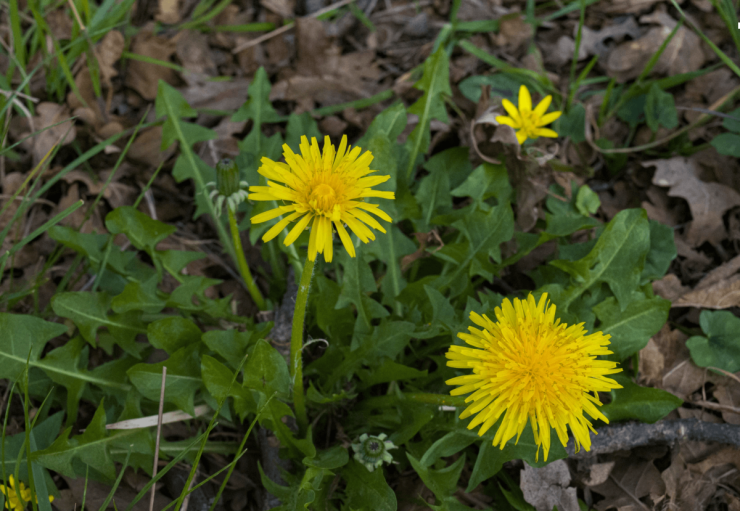
Dandelion
We gardeners spend a lot of time and energy getting rid of weeds. So it may be a little surprising when I say that weeds aren’t always bad. In fact, they can offer you clues that may help your garden succeed. I know what you’re thinking. What do weeds tell you about your soil?
I get it. We’ve spent more than a few words throughout Food Gardening Network talking about how to limit weeds in the garden. We pull them by hand, we lay down plastic to prevent them from germinating, we buy tools specifically for removing weeds, and there are even adorable little robots that will remove weeds for us.
But before you break out the Cobra or the Japanese Hori-Hori Weeding Knife (a personal favorite!), let me answer your questions. You may find that weeds can be your friend at times.
Discover 7 top tips for growing, harvesting, and enjoying tomatoes from your home garden—when you access the FREE guide The Best Way to Grow Tomatoes, right now!
What are weeds?
What do weeds tell you about your soil? First, let’s set the record straight about what weeds are. PennState Extension characterizes weeds as “plants whose undesirable qualities outweigh their good points.” These plants are competitive and persistent, and, as you know, will take the water and nutrients in the soil, leaving your vegetables to suffer.
There’s a large caveat here, though. Weeds can also be a habitat for wildlife and a source of nectar for bees and other pollinators. They can help stabilize soil, and some of them are edible and quite delicious. Enough with definitions, though. Let’s move on and find out how these weeds can help you in the garden.
What do weeds tell you about your soil? More than you might think.
Head out to the garden, and you may find that your soil is compacted. Maybe it’s soggy and doesn’t drain well. Or it may be loose to the point of easily eroding. Test it, and the results may reveal that your soil is void of nutrients.
You already know that there is a “middle ground” of soil conditions that most plants enjoy. You also know some plants prefer different soil types, whether a little more acidic, drier, looser, and so on. And you know weeds are plants (even if we don’t want these particular plants in our garden).
You can probably see where I’m going with this. Certain weeds give us information about the health of our soil. Now then, more specifically, what do weeds tell you about your soil? Here are some common garden weeds and what they have to tell you.
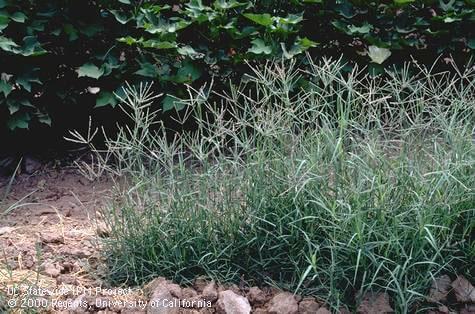
Bermuda grass
Photo by Jack Kelly Clark. Courtesy of the University of California.
Bermuda grass
What do weeds tell you about your soil when it’s a weed like Bermuda grass that will grow pretty much anywhere it’s warm enough? That’s a good question. However, this is one of those weed indicators you can use in conjunction with other factors. For example, Bermuda grass grows well in both clay and sandy soil and is tolerant of salty conditions. Since dandelions also grow well in compacted clay soil, if you have both, then there’s a good chance your soil is clay.
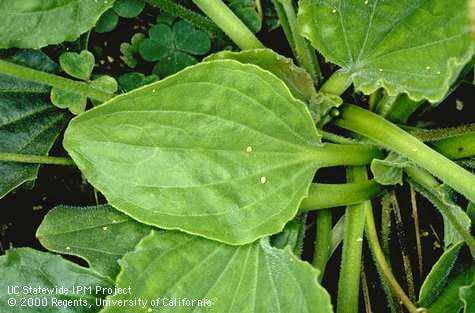
Broadleaf plantain
Photo by Joseph M. DiTomaso. Courtesy of the University of California.
Broadleaf plantain
The broadleaf plantain has medicinal properties, was once used as an anti-inflammatory, and is edible. Unfortunately, it’s also a weed. As far as what it can tell you about your soil, the University of Florida points out that broadleaf plantain “prefers soil with a high pH,” such as those in areas with a lot of limestone.
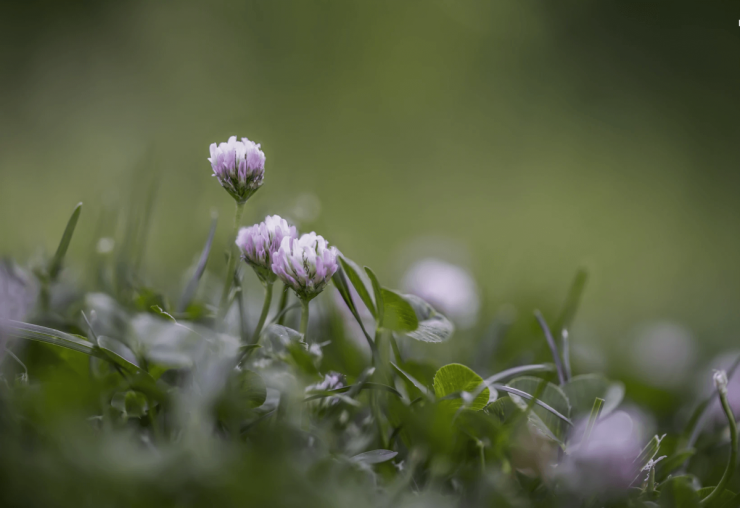
Clover
Clover
Clover is a favorite of bees. However, the University of California points out that clover ” thrives with low levels of nitrogen in the soil.” That said, clover can also make a fabulous ground cover.
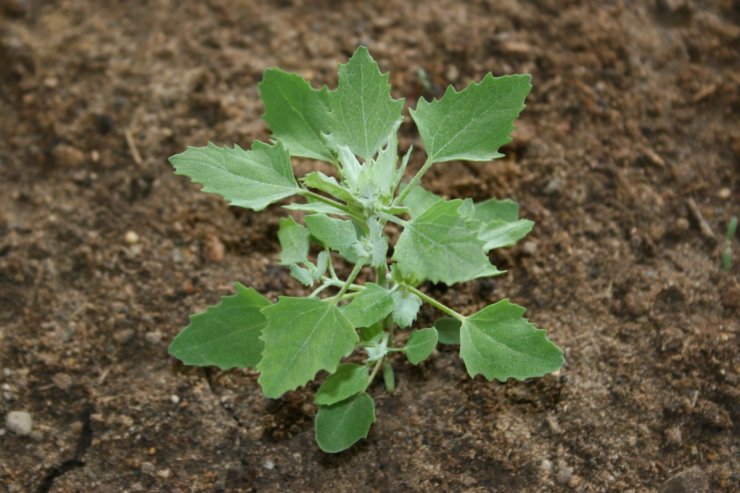
Common lambsquaters
Courtesy of Michigan State University.
Common Lambsquarters
The common lambsquarters is found throughout the U.S. and Canada. Chances are, if you have a garden, you’ve seen it. If you notice this weed, you may have compacted clay soil. It may also indicate that your soil is low in phosphorous and high in potassium.

Dandelion
Dandelion
I feel like the dandelion has an especially bad reputation. Maybe it’s because they’re so common? Here’s what I do know. Bees love dandelions. They are some of the first flowers to come up in spring when bees are looking to replenish their food stores. Dandelions are also quite tasty in the kitchen. As for your soil? Dandelions can indicate compact soil. If they can grow through asphalt, certainly your trampled section of the garden is no match! Dandelions may also indicate low levels of calcium. Incidentally, chickweed, Bermuda grass, and morning glories also grow well in compacted soil.
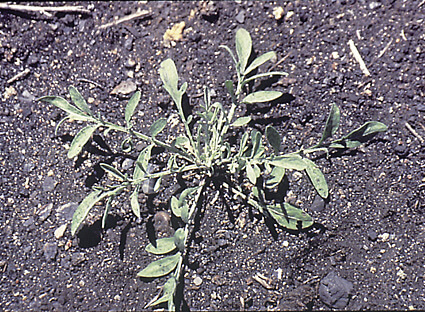
Knapweed
Courtesy of North Dakota State University
Knapweed
What do weeds tell you about your soil? Well, if that weed is knapweed, it’s telling you there’s a problem. To begin with, knapweed thrives in depleted soil, but the problem is really much worse. Here’s what the United States Forest Service has to say about this plant: “Native to Europe; spotted knapweed is a very competitive and aggressive plant with allelopathic effects; stands of spotted knapweed may persist indefinitely once established.” North Dakota State University recommends wearing gloves and pulling the weed by hand and burning it, followed by treating the soil with herbicide.
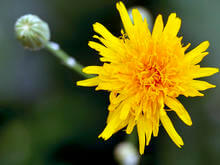
Perennial sow thistle flower
Courtesy of University of Minnesota Extension.
Sow Thistle
There are a few different varieties of sow thistle, but they all look pretty similar. Texas A&M Agrilife Extension describes them as “tall weeds with yellow, dandelion-like flowers and stems that produce a milky sap.” Like most weeds, sow thistle can grow pretty much anywhere, but in your garden, it may be a sign of heavy, dry soil.
Of course, there are many more weeds out there. Nevermind that the definition is up for a little debate, I think we can all agree that the more help we can get in our garden, even if it’s from weeds, the better off we’ll all be.
Do you have any plants or “weeds” in your garden that are telltale signs of a soil issue?
Note: Food Gardening Network contains links to affiliate websites, including Amazon and Rakuten Affiliate Network, and we may receive a commission for any eligible purchases made by you through links on this page. Any reviews are based on honest reviews of the products.
Discover 7 top tips for growing, harvesting, and enjoying tomatoes from your home garden—when you access the FREE guide The Best Way to Grow Tomatoes, right now!





I have a Gooseberry weed that is actually very pretty but I’m afraid it is going to take over my garden! Is it very invasive and will it destroy my garden?
Gosh I love Gooseberries, but I’d never grow it outdoors. It’s not even legal to grow in my area because it’s so invasive. I would cut it back if you’re able to.